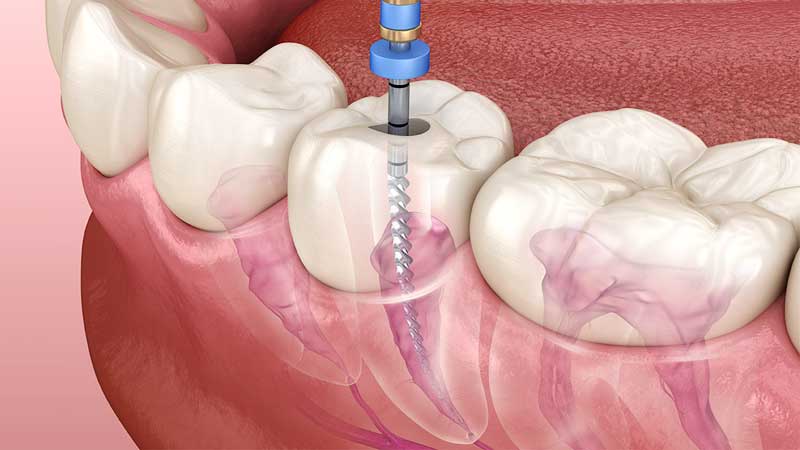
An infected tooth can cause all kinds of problems for both your oral health and your overall well-being. When your tooth becomes infected, you risk losing the tooth and there is also a chance of the infection spreading. Root canal therapy (also known as endodontic therapy, endodontic treatment, or root canal treatment) can save your tooth, so you do not need an extraction.
Root canal therapy is a treatment sequence for the infected pulp of a tooth which is intended to result in the elimination of infection and the protection of the decontaminated tooth from future microbial invasion. The success of Root canal therapy (RCT) depends on proper cleaning and shaping of a root canal, disinfection, and three-dimensional filling of the canal system. SmileCentre India offering the latest sterilization and disinfection protocols as well as the most advanced techniques in dental technology to ensure the highest possible success of your root canal treatment.
What is Root Canal?
At the center of a tooth is a hollow area that houses soft tissue, known as pulp or nerve. This hollow area contains a relatively wide space in the coronal portion of the tooth called the pulp chamber. This chamber is connected to the tip of the root via a narrow canal(s); hence, the term “root canal”. Human teeth normally have one to four canals, with teeth toward the back of the mouth having more. These canals run through the center of the roots like pencil lead through the length of a pencil. The pulp receives nutrition through the blood vessels and nerves carry signals back to the brain to warn of adverse events and circumstances.
Dental decay, when it progresses from the surface of the tooth to reach the pulp chamber, root canal infection results. Therefore, for a person who feels tooth pain or discomfort, a root canal treatment may be indicated, and a qualified dentist or more preferably an endodontist (root canal therapy specialist) should be consulted in a timely manner.
Benefits of Root Canal Treatment
- Remove infections: Removes bacteria and infection, thereby removing associated discomfort.
- Protect neighboring teeth: It prevents the spread of infection to other teeth.
- Retain your original tooth: Root canal treatment allows patients to keep the natural tooth, the tooth’s root will continue to stimulate the bone and hence do not have to worry about bone loss.
- Restores the structure of your tooth: if completing the treatment with a dental crown, crowns not only function like natural teeth but also improve your smile.
- Durable and long-lasting: Root canals are over 95% successful and can last a lifetime If they are having permanent restoration (fillings or crowns).
- Virtually pain-free procedure: With modern technology and better anesthetics, root canal treatments are no more painful than having a filling or a tooth extraction.
- Save your valuable time: With today's cutting edge technology, most root canals can be performed in one or two office visits.
Who is eligible for root canal treatment?
SmileCentre India can easily diagnose the condition of your teeth and tell if you really need root canal treatment. A root canal can happen at any age. It is primarily dictated by decay and the amount of dental work on one tooth. Whether young or old. A person is not eligible for undergoing a root canal in certain conditions like the tooth is poorly embedded in the jawbone (e.g., due to periodontitis), has a cracked root, Osteoporosis (the condition wherein the bones become brittle and weak), the tooth is too badly damaged or having some autoimmune diseases. The treatment will not perform when the patient is suffering from Infections or fever.
How much does a root canal cost?
The cost of a root canal procedure may range from INR 3500 to INR 12,000 approximately (not including the cost of a crown restoration) depending upon post and core procedure to strengthen the tooth, the position of the tooth (for example, molars have more canals that need to be filled, so they are more expensive) and levels of severity. In some cases, other endodontic procedures, such as an apicoectomy or periradicular surgery have to be performed at extra cost. Most dental insurance plans cover root canal treatment.

